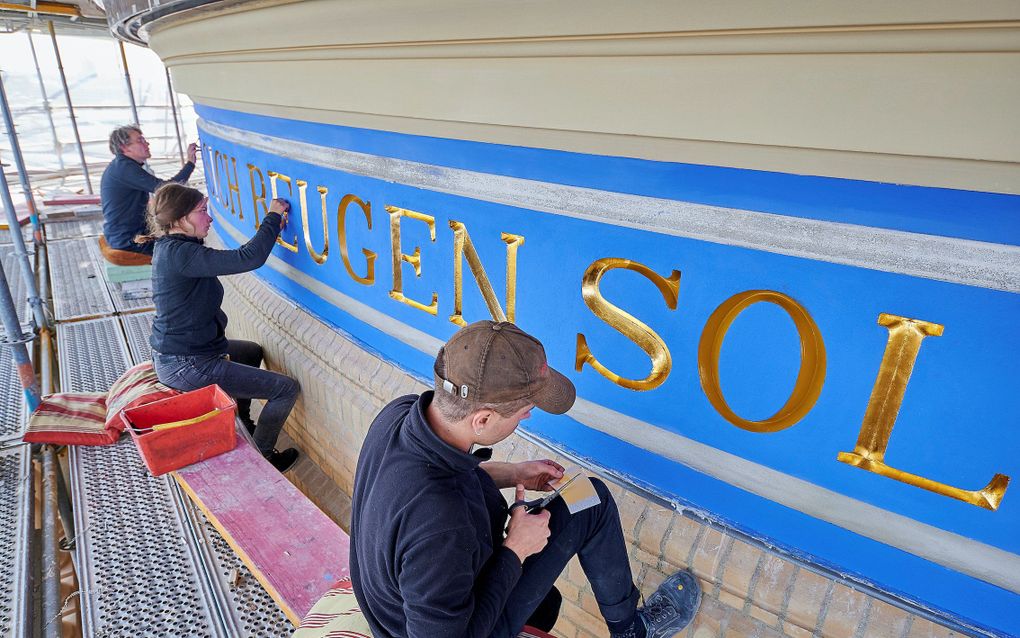Renewed debate about Biblical words on Berlin city palace

The Biblical text on Berlin's city palace is still stirring debate. Photo SHF, Stephan Falk
Central Europe
In Germany, there is renewed discussion about the rebuilt city castle in Berlin. The reason for this is the biblical texts on the monumental dome. The text says that “no other name but Jesus” is given.
The discussion about the biblical texts on the dome has been going on since the plans to rebuild the palace were drawn up at the beginning of the century.
The Prussian King Friedrich-Wilhelm IV built the original palace. In 1845 he provided the dome with a cross and a contraction of two Bible texts. In golden letters measuring 34 centimetres, it said: Under heaven, no other name is given but that of Jesus, before whom every knee will bow (Acts 4:12 and Philippians 2:10). On top is a large cross.
The city castle (next to the Berlin Cathedral) was blown up in 1950, five years after the Second World War. The leaders of the new GDR saw the castle as a symbol of the German monarchy, which had been abolished in 1918. On the spot, the “Palast der Republik” (Palace of the Republic) was built.

Copy of castle was built
Since the fall of the Berlin Wall in 1989 and the reunification of Germany in 1991, the Berlin city authorities had been troubled by the symbol of the former GDR. When asbestos was found in the “Palast” at the beginning of this century, it was decided to demolish it. Instead, the old city castle was to rise from the ashes again, the German authorities decided.
A discussion began about whether the biblical texts on the dome and the cross on top should return from that moment on. A debate that flares up again from time to time, even now that the castle’s construction is completed, the biblical texts can be read again.
The latest discussion was prompted by the opening of a roof terrace at the city palace last month. From there, you can read the inscription in the dome even better than from the ground. Therefore, a plaque will be erected next to the dome with this text: “All institutions in the Humboldt Forum expressly distance themselves from the claim of Christianity to sole validity and dominance expressed in the inscription.”
The institutions of the Humboldt Forum (which ensured that these verses are once again on display on the dome) include the Prussian Cultural Heritage Foundation, the Humboldt University, the Culture project Berlin, and the City Museum.
Text as “intolerant claim”
The initiative is entirely in line with what the regional Bishop of the Evangelical Church Berlin-Brandenburg (EKBO), Christian Stäblein, said in mid-2020: “Intolerant claims to exclusivity are dangerous –even as historical quotations– and need counter-images.”
That statement invoked criticism this weekend from the Lutheran Convention in the Rhineland, reports the German news agency IDEA. In an open letter, the chairman of the Lutheran Convention, Rev. Winfrid Krause (Buggingen), said Stäblein’s statement was “in open contradiction to the Bible’s confession of Christ”. It also contradicts all the German regional churches in the Evangelical Church of the Union (UEK), to which the EKBO also belongs. Stäblein falsely equates the confession of Christ with a claim to worldly claim to power.
“Jews and Muslims won’t be impressed”
“If you substitute humanistic values such as tolerance or dialogue in place of faith in the crucified and risen Lord, you will not impress either a devout Jew or a convinced Muslim.”

In the confessional writings of the Protestant Church in Germany, the principle of “through Christ alone” is clearly represented. When Stäblein describes this principle as “dangerous”, “you give the impression that you no longer express the Christian faith and want to replace it with something else.
The Lutheran Convention in the Rhineland was founded in 1936 in opposition of the National Socialist “German Christians”. Its concern today is to represent the Lutheran confession within the Rhenish Church.




